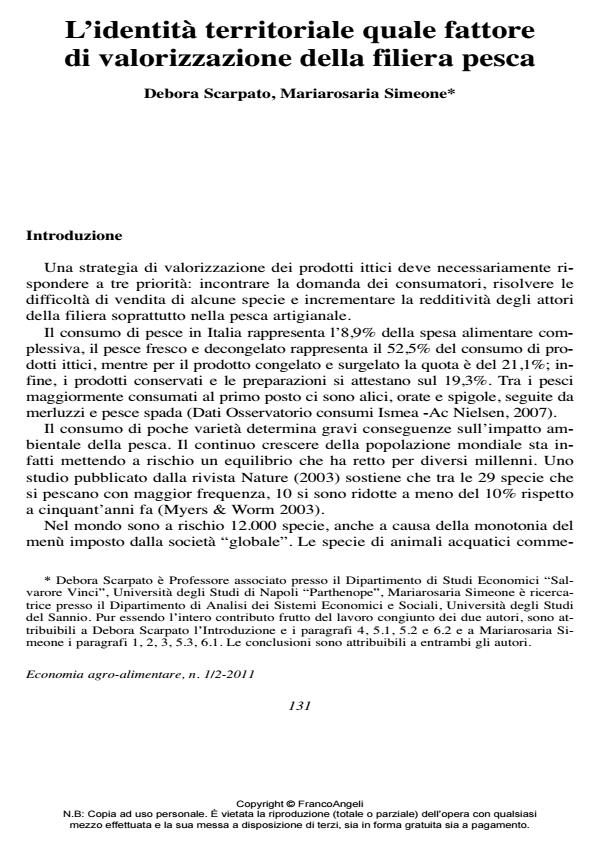L’identità territoriale quale fattore di valorizzazione della filiera pesca
Titolo Rivista ECONOMIA AGRO-ALIMENTARE
Autori/Curatori Debora Scarpato, Mariarosaria Simeone
Anno di pubblicazione 2011 Fascicolo 2011/1-2
Lingua Italiano Numero pagine 23 P. Dimensione file 301 KB
DOI 10.3280/ECAG2011-001007
Il DOI è il codice a barre della proprietà intellettuale: per saperne di più
clicca qui
Qui sotto puoi vedere in anteprima la prima pagina di questo articolo.
Se questo articolo ti interessa, lo puoi acquistare (e scaricare in formato pdf) seguendo le facili indicazioni per acquistare il download credit. Acquista Download Credits per scaricare questo Articolo in formato PDF

FrancoAngeli è membro della Publishers International Linking Association, Inc (PILA)associazione indipendente e non profit per facilitare (attraverso i servizi tecnologici implementati da CrossRef.org) l’accesso degli studiosi ai contenuti digitali nelle pubblicazioni professionali e scientifiche
A valorization strategy needs to meet three main priorities: fulfil customer needs, be profitable to the operator and solve the problem of selling the products on the market. The first objective of this research was to understand the target species of interest for a sustainable valorization strategy of fish products. The target species are those of low commercial value which are fished locally during the whole year and can be consumed both as fresh fish and as transformed fish products. The choice of these fish species was based on the unsustainable fish catches and on the local historical assets of the traditional methods of fishing and of the conservation techniques. In particular, we focus our attention on the fish known as "poor fish", which has a lower commercial attraction compared to the well known fish species. This work is articulated in several different steps: the description of the type of species chosen, the analysis of fish consumer demand and the added value that comes from local identity and from the culture of production and consumption. The outcome of these results form the base to define the valorization strategies to adopt. This research was conducted in the Lazio region. After a preliminary analysis of Lazio’s fish export towards eu 27, compared to exports of other Italian regions towards the eu 27, the Lazio region did not show a competitive advantage in this sector. Even if it is not competitive in terms of fish export, this region showed some productive characteristics that can be extended to several other cases. In fact, it has a productive tradition of fishing but it is only marginal fishing in terms of quantity and quality of the local fish species. The empirical analysis conducted on local consumers showed a local fish culture on a consumption that, together with fishing methods, local fish consumption and production characteristics, suggested a valorization strategy based on the territorial identity factors.
Parole chiave:"poor fish species", sustainable consumption, local values, sustainable fish, valorization
Jel codes:Q22; Q13; O13
Debora Scarpato, Mariarosaria Simeone, L’identità territoriale quale fattore di valorizzazione della filiera pesca in "ECONOMIA AGRO-ALIMENTARE" 1-2/2011, pp , DOI: 10.3280/ECAG2011-001007